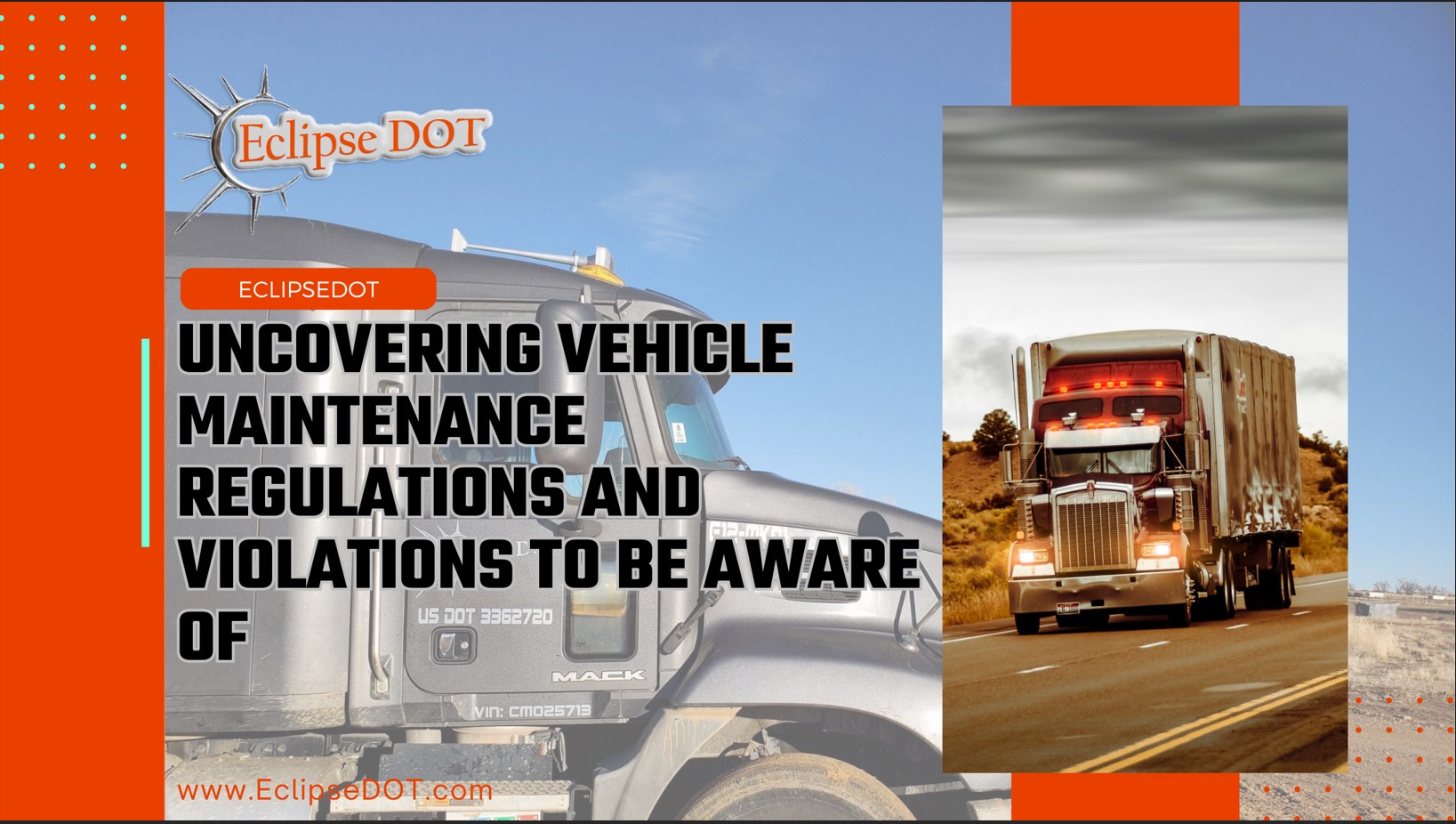Uncovering Vehicle Maintenance Regulations and Violations To Be Aware Of
Hey everyone, Dan here! Ready for another deep dive into FMCSA regulations? Today, we’re tackling Vehicle Maintenance Regulations. In case you missed our last post on Hours of Service (HOS), you can read it here. It’s the first part of our FMCSA series and goes in-depth on HOS regulations and violations.
I know I’ve been going on about FMCSA regulations, but they’re crucial. I want to make sure you’re safeguarding your company, and if you’re a driver, protecting yourself from any potential violations that could impact your day-to-day activities.
Now, let’s rev up and roll into the nitty-gritty of vehicle maintenance regulations. There’s a lot to cover, but trust me, it’s all worth knowing. Plus, you’ll have some great insights to share with your team!
Insights Into Vehicle Maintenance Regulations
Keeping your fleet in top-notch condition isn’t just good practice—it’s the law. According to FMCSA regulations, inadequate vehicle maintenance can lead to mechanical failures, accidents, and serious safety hazards on our roads. I always stress safety because it’s not just about you; it’s about everyone on the road. So, let’s keep safety as our top priority!
Staying on top of maintenance tasks and adhering to FMCSA standards is essential for every carrier. Now, onto the next bit: record-keeping. Think of it as your vehicle’s diary. If you get pulled over and your records are outdated, you could face fines and put your business at risk. Not fun, right?
Vehicle Recordkeeping Requirements
Vehicle Inspection Reports (DVIR): Before hitting the road, drivers must conduct thorough pre-trip inspections and document any defects or deficiencies in a Driver Vehicle Inspection Report (DVIR). This also includes post-trip inspections. These reports serve as critical records of the vehicle’s condition and any maintenance needs after a haul is complete. Without these files, you might not know if your vehicles are in tip-top shape, putting yourself at risk of potential fines.
Carriers must maintain detailed records of all maintenance activities, including repairs, inspections, and servicing. These records must be retained for at least one year and made readily available during roadside inspections and audits.
Roadside Inspection Requirements
FMCSA conducts roadside inspections to ensure vehicles are operating safely and in compliance with regulations. Inspectors may review vehicle maintenance records, inspect critical components, and issue violations for non-compliance. These violations could lead to fines or even an out-of-service order being issued, resulting in lost revenue.
Whenever a vehicle undergoes repairs or maintenance, carriers need to write detailed repair orders documenting the work performed, parts replaced, and the date of service. These repair orders serve as evidence of compliance during audits and inspections.
For example, if a vehicle is found to have a critical maintenance violation during a roadside inspection, it may be placed out of service until the violation is corrected. Your company may face fines for each violation found. These fines can vary widely depending on the nature of the violation and whether it’s a first-time offense or a repeat violation.
Common Issues and Challenges with Vehicle Maintenance
Recordkeeping Glitches: Failing to maintain records of vehicle maintenance activities can lead to compliance issues during audits or roadside inspections. Ensure all maintenance and repair activities are documented promptly and accurately.
Procrastinating Repairs: Delaying necessary repairs or maintenance to save costs can result in vehicle breakdowns, mechanical failures, and safety hazards on the road. Prioritize timely maintenance to ensure the safety and reliability of your fleet.
Lack of Training: Regular training sessions for drivers and maintenance personnel on proper inspection procedures and maintenance practices can prevent oversight of critical safety issues. By adhering to FMCSA’s vehicle maintenance regulations, maintaining accurate records, and prioritizing safety, you can ensure that your vehicles operate safely and efficiently on the road.
FMCSR Record Retention
In transportation compliance, paperwork isn’t just a necessary evil—it’s your lifeline. FMCSA regulations demand meticulous recordkeeping, from the moment your driver starts their engine to the final inspection of your fleet. Failing to keep accurate records isn’t just a paperwork problem; it’s a liability waiting to happen.
For example, if your driver completes their pre-trip inspection, noting a minor issue with the brakes in their DVIR, but the repair is postponed and the issue slips through the cracks, this overlooked DVIR becomes a glaring red flag during an audit, putting your compliance—and your reputation—on the line.
FMCSA audits are thorough and leave no stone unturned. Incomplete or inaccurate records can raise serious concerns about your commitment to safety and regulatory compliance. Missing driver logs, incomplete maintenance records, or overlooked inspection reports could land you in hot water during an audit.
Managing the mountain of paperwork required for compliance can feel overwhelming, but it doesn’t have to be. Implementing streamlined recordkeeping processes, leveraging technology like electronic logging devices (ELDs), and providing comprehensive training for your staff can help ensure that no record goes missing when it counts.
In the face of ever-changing regulations and the constant influx of paperwork, it pays to have experts in your corner. Companies like ours specialize in helping carriers navigate the complexities of compliance, offering tailored solutions to ensure that your recordkeeping practices are not just up to par but ahead of the curve.
Benefits of Accurate Recordkeeping
By prioritizing accurate and comprehensive documentation, you’re not just staying compliant; you’re safeguarding the safety of your drivers, protecting your business, and ensuring smooth sailing through even the toughest audits. So, don’t let paperwork pile up and become a liability.
Safety and Compliance: Accurate records ensure that your vehicles are maintained properly, reducing the risk of mechanical failures and accidents. This contributes to the overall safety of your fleet and other road users.
Avoiding Fines: Keeping detailed records helps you avoid costly fines and penalties during audits and roadside inspections. Compliance with FMCSA regulations demonstrates your commitment to safety and professionalism.
Operational Efficiency: Well-maintained records can streamline your operations by providing clear insights into your maintenance schedules, repair needs, and overall fleet health. This helps in planning and decision-making, ensuring that your fleet runs efficiently.
Reputation Management: Maintaining thorough and accurate records enhances your company’s reputation. It shows regulators, clients, and partners that you prioritize safety and compliance, which can lead to more business opportunities and trust in your operations.
Conclusion
Get ahead of the game with meticulous recordkeeping practices that keep you on the right side of the law and ahead of the competition.
I hope this was a good and easy read for you. I highly encourage you to share this with your team. So, the next time you find yourself drowning in a sea of paperwork or grappling with a tricky compliance issue, remember that you don’t have to do it alone. Utilize our expertise and guidance, and you can navigate the complexities of FMCSA regulations with confidence, ensuring the safety and success of your operation.
Let us help you understand these regulations. Contact us today to see how we can assist you with your compliance.
Discover our CDL & DOT Compliance articles for an exclusive trial at DOTDocs.com. Also, claim your FREE micro audit at THE ECLIPSE DOT MICRO AUDIT. Ready for smoother operations?



3 thoughts on “Uncovering Vehicle Maintenance Regulations and Violations To Be Aware of”
Thanks for sharing. I read many of your blog posts, cool, your blog is very good.
Thanks for sharing. I read many of your blog posts, cool, your blog is very good.
Thanks for sharing. I read many of your blog posts, cool, your blog is very good.